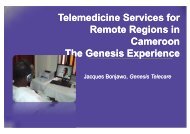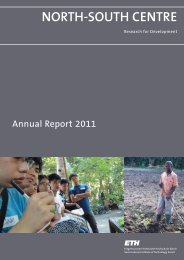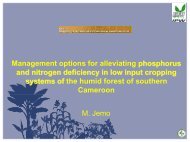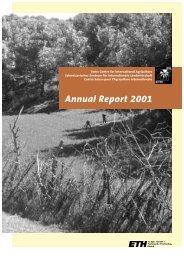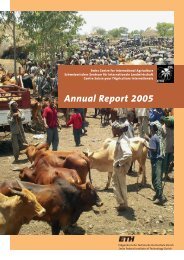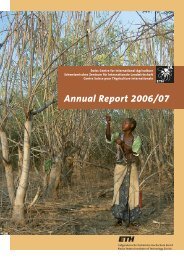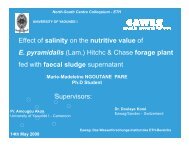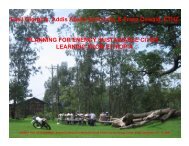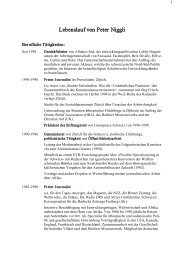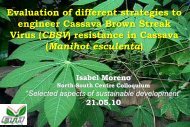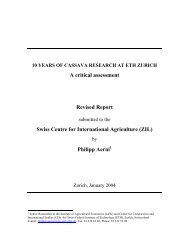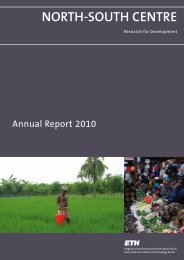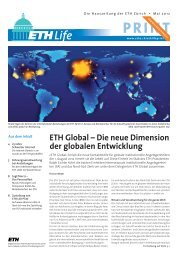NORTH-SOUTH CENTRE - ETH - North-South Centre North-South ...
NORTH-SOUTH CENTRE - ETH - North-South Centre North-South ...
NORTH-SOUTH CENTRE - ETH - North-South Centre North-South ...
You also want an ePaper? Increase the reach of your titles
YUMPU automatically turns print PDFs into web optimized ePapers that Google loves.
The benefits<br />
After having discussed the various challenges of R4D, let<br />
us now focus on its benefits. What are the desired outputs<br />
of R4D?<br />
26<br />
FOCUS<br />
Research for development<br />
Urs Wiesmann<br />
Urs Wiesmann is a human geographer by profession. He is<br />
the Director of the <strong>Centre</strong> for Development and Environment<br />
of the University of Bern, and together with Hans Hurni, he<br />
heads the Swiss National <strong>Centre</strong> of Competence in Research<br />
<strong>North</strong>-<strong>South</strong> (NCCR <strong>North</strong>-<strong>South</strong>). His main areas of professional<br />
focus are sustainable regional development, natural resources<br />
management and global change particularly in developing and<br />
transition countries, as well as interdisciplinary and transdisciplinary<br />
methodology and its application in the context of<br />
development and environment. Urs Wiesmann has conducted<br />
research in the Swiss Alps, in Africa (Kenya, Tanzania, Madagascar,<br />
Ethiopia, and Morocco), and in Asia (Kyrgyzstan, India,<br />
Laos, and Vietnam).<br />
The NCCR <strong>North</strong>-<strong>South</strong> is an innovative research programme<br />
in the fields of global change and sustainable development.<br />
Encompassing a network of over 400 researchers active in<br />
more than 40 countries worldwide, it is dedicated to finding<br />
sustainable, practicable solutions to specific challenges of<br />
global change.<br />
leaflets are now one of the indicators for evaluating<br />
researchers.<br />
Barbara Becker: It would be worthwhile to consider such an<br />
evaluation system for Swiss universities as well.<br />
Urs Wiesmann: I think, another aspect should not be forgotten:<br />
Interdisciplinarity is related to methodological innovation.<br />
However, these innovations are not published enough<br />
because – again – the peers are missing. Not only the relevance<br />
of R4D but also its scientific impact in developing<br />
thoughts, methodologies, and knowledge is important. In<br />
order to strengthen that outcome we have to develop a<br />
community. For example in Switzerland, the few institutions<br />
involved in R4D have to support each other very strongly<br />
and build capacity together.<br />
Barbara Becker: I would like to come back to my earlier comments<br />
on outputs, outcomes and impacts. When we talk<br />
about R4D, I immediately associate impacts such as poverty<br />
alleviation, or income generation. On the output side,<br />
I think of scientific results which are being taken up by a<br />
community outside the immediate research environment.<br />
This could be with a leaflet, as Bassirou said, and also accidentally,<br />
when somebody comes across a publication and<br />
thinks this could be useful for application. Finally, another<br />
desired output is that the research results are relevant in<br />
some way or other, that they describe a technology, methodology,<br />
or product, which has the potential for application<br />
and implementation.<br />
Urs Wiesmann: Outputs – I think that the important point<br />
is that in R4D you have to have a very broad variety of different<br />
forms of output. As said before, you cannot rely on<br />
journals only. Talking of the outcomes, for me the main outcomes<br />
are capacities in dealing with the research-society<br />
interface, or knowledge-society interface. We need to<br />
couple capacity development directly with the research.<br />
Second, that we see development as a global concern, and<br />
build alliances through that. These alliances among researchers<br />
from all over the world are crucial. We have to build<br />
our own programmes and projects and cannot wait for the<br />
donors to provide us with such programmes. Finally, the<br />
vital goal is to have a more knowledge-based and development-relevant<br />
decision-making – so that knowledge and<br />
not just power is the guiding principle of decision-making.<br />
This has something to do with justice in the sense that the<br />
interests of the most part of society and of the future generations<br />
influence decision-making.<br />
Isabel Guenther: I think the benefit of R4D is that you are<br />
not only tackling scientifically interesting research questions,<br />
but also research questions that are relevant for society.<br />
Many researchers do not see that their research could<br />
be applied to a development context. To put R4D on the<br />
screen of many more researchers might be another output<br />
one could aim for. Lastly, and as Urs said, another important<br />
point is that development policies should more often be<br />
based on knowledge, and therefore research.<br />
Bassirou Bonfoh: For me, the benefit of engaging ourselves<br />
in R4D is that we gain legitimacy vis-à-vis the decision-



